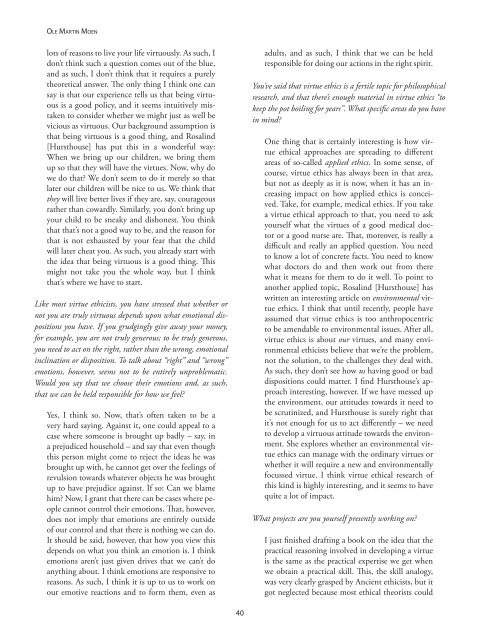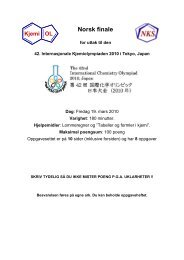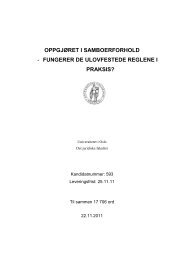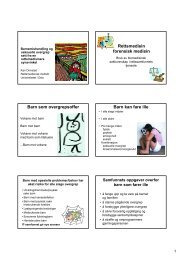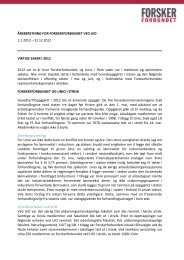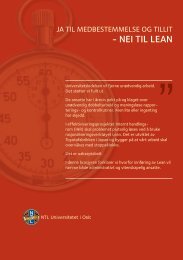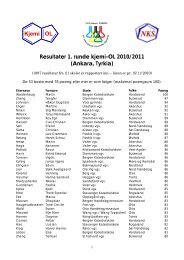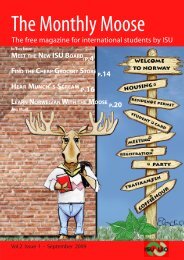filosofisk supplement - Universitetet i Oslo
filosofisk supplement - Universitetet i Oslo
filosofisk supplement - Universitetet i Oslo
- No tags were found...
You also want an ePaper? Increase the reach of your titles
YUMPU automatically turns print PDFs into web optimized ePapers that Google loves.
Ole Martin Moen<br />
lots of reasons to live your life virtuously. As such, I<br />
don’t think such a question comes out of the blue,<br />
and as such, I don’t think that it requires a purely<br />
theoretical answer. The only thing I think one can<br />
say is that our experience tells us that being virtuous<br />
is a good policy, and it seems intuitively mistaken<br />
to consider whether we might just as well be<br />
vicious as virtuous. Our background assumption is<br />
that being virtuous is a good thing, and Rosalind<br />
[Hursthouse] has put this in a wonderful way:<br />
When we bring up our children, we bring them<br />
up so that they will have the virtues. Now, why do<br />
we do that We don’t seem to do it merely so that<br />
later our children will be nice to us. We think that<br />
they will live better lives if they are, say, courageous<br />
rather than cowardly. Similarly, you don’t bring up<br />
your child to be sneaky and dishonest. You think<br />
that that’s not a good way to be, and the reason for<br />
that is not exhausted by your fear that the child<br />
will later cheat you. As such, you already start with<br />
the idea that being virtuous is a good thing. This<br />
might not take you the whole way, but I think<br />
that’s where we have to start.<br />
Like most virtue ethicists, you have stressed that whether or<br />
not you are truly virtuous depends upon what emotional dispositions<br />
you have. If you grudgingly give away your money,<br />
for example, you are not truly generous; to be truly generous,<br />
you need to act on the right, rather than the wrong, emotional<br />
inclination or disposition. To talk about “right” and “wrong”<br />
emotions, however, seems not to be entirely unproblematic.<br />
Would you say that we choose their emotions and, as such,<br />
that we can be held responsible for how we feel<br />
Yes, I think so. Now, that’s often taken to be a<br />
very hard saying. Against it, one could appeal to a<br />
case where someone is brought up badly – say, in<br />
a prejudiced household – and say that even though<br />
this person might come to reject the ideas he was<br />
brought up with, he cannot get over the feelings of<br />
revulsion towards whatever objects he was brought<br />
up to have prejudice against. If so: Can we blame<br />
him Now, I grant that there can be cases where people<br />
cannot control their emotions. That, however,<br />
does not imply that emotions are entirely outside<br />
of our control and that there is nothing we can do.<br />
It should be said, however, that how you view this<br />
depends on what you think an emotion is. I think<br />
emotions aren’t just given drives that we can’t do<br />
anything about. I think emotions are responsive to<br />
reasons. As such, I think it is up to us to work on<br />
our emotive reactions and to form them, even as<br />
adults, and as such, I think that we can be held<br />
responsible for doing our actions in the right spirit.<br />
You’ve said that virtue ethics is a fertile topic for philosophical<br />
research, and that there’s enough material in virtue ethics “to<br />
keep the pot boiling for years”. What specific areas do you have<br />
in mind<br />
One thing that is certainly interesting is how virtue<br />
ethical approaches are spreading to different<br />
areas of so-called applied ethics. In some sense, of<br />
course, virtue ethics has always been in that area,<br />
but not as deeply as it is now, when it has an increasing<br />
impact on how applied ethics is conceived.<br />
Take, for example, medical ethics. If you take<br />
a virtue ethical approach to that, you need to ask<br />
yourself what the virtues of a good medical doctor<br />
or a good nurse are. That, moreover, is really a<br />
difficult and really an applied question. You need<br />
to know a lot of concrete facts. You need to know<br />
what doctors do and then work out from there<br />
what it means for them to do it well. To point to<br />
another applied topic, Rosalind [Hursthouse] has<br />
written an interesting article on environmental virtue<br />
ethics. I think that until recently, people have<br />
assumed that virtue ethics is too anthropocentric<br />
to be amendable to environmental issues. After all,<br />
virtue ethics is about our virtues, and many environmental<br />
ethicists believe that we’re the problem,<br />
not the solution, to the challenges they deal with.<br />
As such, they don’t see how us having good or bad<br />
dispositions could matter. I find Hursthouse’s approach<br />
interesting, however. If we have messed up<br />
the environment, our attitudes towards it need to<br />
be scrutinized, and Hursthouse is surely right that<br />
it’s not enough for us to act differently – we need<br />
to develop a virtuous attitude towards the environment.<br />
She explores whether an environmental virtue<br />
ethics can manage with the ordinary virtues or<br />
whether it will require a new and environmentally<br />
focussed virtue. I think virtue ethical research of<br />
this kind is highly interesting, and it seems to have<br />
quite a lot of impact.<br />
What projects are you yourself presently working on<br />
I just finished drafting a book on the idea that the<br />
practical reasoning involved in developing a virtue<br />
is the same as the practical expertise we get when<br />
we obtain a practical skill. This, the skill analogy,<br />
was very clearly grasped by Ancient ethicists, but it<br />
got neglected because most ethical theorists could<br />
40


